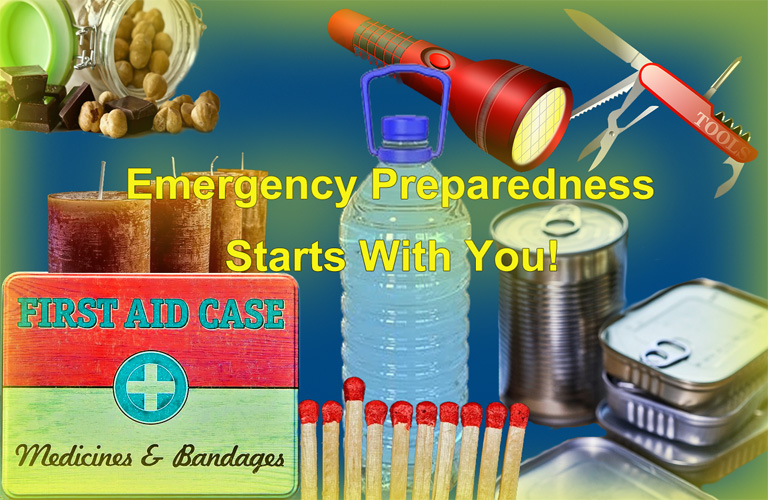Emergency Tips
In the event of an emergency, everyone should be prepared to take care of themselves and their families for at least up to three days.
Make sure that your emergency survival kit has:
- First aid kit
- Flashlight and spare batteries
- Candles and lighter or matches
- Radio and batteries or crank radio
- Bottled water for at least three days (at least 1 gallon per family member per day for drinking and sanitation)
- Food ( at least a three-day supply of non-perishable food)
- Complete change of clothing appropriate for your climate and sturdy footwear
- Blankets, sleeping bags for each person and tarps
- Toilet paper, feminine supplies and other personal hygiene items
- Your medication and non-prescription medications such as pain relievers, anti-diarrhea medication, antacids or laxatives
- Extra car keys and fire extinguisher
- Important papers for your identification, cash and traveler's checks
- Whistle to signal for help
- Manual can opener for food, multi tool and knife
- Your glasses or contact lenses and solution to clean them
- Dust mask, to help filter contaminated air and plastic sheeting and duct tape to shelter-in-place
- Paper and pencil
- Pet food and extra water for your pet
- Cell phone with chargers and a backup battery
- Cards, games, and other activities for children
"Watch out for emergencies. They are your big chance." ~ Fritz Reiner
What You Should Know
All of us should take some simple steps to prepare for and respond to potential emergencies, including natural disasters and terrorist attacks.
You should do three key things: get an emergency supply kit, make a family emergency plan, and be informed about the different types of emergencies that could occur and their appropriate responses.
Have some basic supplies on hand in order to survive for at least three days if an emergency occurs.
It is very important to make and review your emergency list and consider where you live and the unique needs of your family in order to create an emergency supply kit that will meet these needs.
Consider having at least two emergency supply kits, one full kit at home and smaller portable kits in your workplace, vehicle or other places you spend time.






